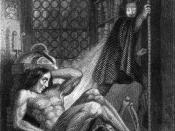Mary Shelley's 1831 novel Frankenstein and Ridley Scott's 1991 film Blade Runner are two texts that engage with contemporary values and beliefs. These two texts are significant because they explore the theme of technological apocalypse through the reference to hubris, humanity and ethics in the advancement of technology. Both TEXTS PROTAGONISTS Victor and Tyrell are blinded by their achievements, their unethical actions leading to the creation of the harbingers of not only their doom, but the world and people around them.
Hubris is a characteristic that reflected by many contemporary issues. For example the morality of the cloning debate and stem cell dilemma are reflections of Victor's obsession with science and progress. Hubris is the excessive pride of those with power made manifest in that individuals come to see themselves as godlike. For Victor the control of life and death appealed to his ego, he considers natural environments to be his slave:"I had chased nature to her very hiding place."and
is egotistical to the extent that he sees himself as god, proclaiming:"new species bless me as their creator".
However as with all egotistical protagonists the inevitability of his downfall is absolute, just as in the setting of the Greek promethean hubris and that of the Gothic Romantic scientist trespassing the domain of god. The creature's vengeance is the ultimate price Victor pays for his hubris. Shelley foreshadows Victor's inevitable suffering through the irony of his own advice:"I seek for knowledge⦠I hope yours may not be a serpent as mine had been."This alludes to the fall from Eden as Adam and Eve gained 'forbidden knowledge,' it is a double metaphor that plays on both the knowledge Victor gains, as well as the loss of innocence of the monster as it goes into the real world.
Much like Victor...


